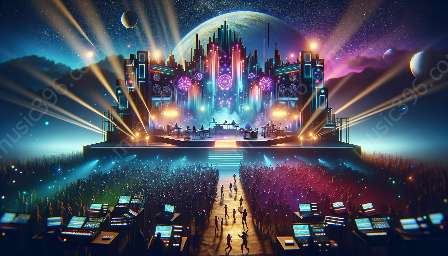In today's digital age, the influence of online discourse on the evolution of electronic music subcultures cannot be overstated. As a genre that has grown alongside the advent of the internet, electronic music has been deeply intertwined with online communities and discourse, shaping the way it is created, shared, and experienced by enthusiasts around the world.
Understanding Electronic Music Subcultures
Before delving into the role of online discourse, it's essential to understand the diverse and dynamic nature of electronic music subcultures. From techno and house to drum and bass and dubstep, electronic music encompasses a wide array of genres, each with its unique fanbase and cultural influences. These subcultures often manifest through music festivals, clubs, and niche online platforms, creating tightly knit communities of like-minded individuals.
The Power of Online Communities in Electronic Music
Online communities have played a pivotal role in the proliferation of electronic music subcultures. Platforms such as forums, social media groups, and music streaming services have allowed fans, artists, and industry professionals to connect, share music, discuss trends, and organize events. This digital connectivity has not only amplified the reach of electronic music but has also accelerated its evolution by facilitating the exchange of ideas and creative collaboration.
Shaping the Sound: Collaborative Production and Feedback Loops
One of the most significant impacts of online discourse on electronic music subcultures is its role in shaping the sound and production techniques within the genre. Online communities provide a space for artists to share their work, receive feedback, and collaborate with peers from different cultural and geographical backgrounds. This diversity of perspectives has led to the cross-pollination of musical styles, resulting in innovative subgenres and hybrid sounds that reflect the global nature of electronic music.
Discovering and Defining Identities
Online discourse has also been instrumental in the formation and evolution of subcultural identities within the electronic music community. Through discussions on social media, dedicated forums, and music blogs, enthusiasts have been able to explore and define their individual and collective identities within the electronic music landscape. These online spaces have facilitated the discussion of cultural, political, and artistic themes, allowing subcultures to articulate their ethos and values.
Challenges and Opportunities
While online discourse has undeniably enriched electronic music subcultures, it also presents challenges. The democratization of music production and distribution through online platforms has led to oversaturation and diluted the visibility of emerging talent. Additionally, online discussions can sometimes foster toxicity and conflicts within communities, affecting the overall experience for participants. However, these challenges also present opportunities for the community to self-regulate, promote inclusivity, and raise awareness about important issues.
Looking Ahead: Future Trends and Developments
As technology continues to evolve, the role of online discourse in electronic music subcultures is poised to undergo further transformation. Virtual reality, live streaming, and immersive online experiences are likely to redefine how fans engage with music and each other, offering new avenues for artistic expression and community participation. Furthermore, the emergence of AI-generated music and blockchain-based platforms may introduce new paradigms for collaboration and ownership within electronic music subcultures.
Conclusion
The evolution of electronic music subcultures is intricately linked to the dynamics of online discourse. From shaping the sonic landscape to fostering cultural identities and forging global connections, online communities have been instrumental in driving the growth and diversification of electronic music. By embracing the opportunities and addressing the challenges of online discourse, electronic music subcultures can continue to thrive and evolve in the digital age.


